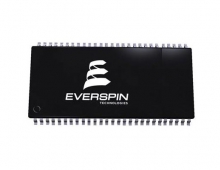
Everspin To Unveils Low Latency nvNITRO PCIe NVMe Storage Accelerators Based on Spin Torque MRAM
Everspin Technologies, a provider of MRAM solutions, will display its nvNITRO storage accelerator product family at the upcoming Embedded World 2017 Conference.
Visitors can also learn about how MRAM can be used in automotive and industrial applications in the show held in Nuremberg, Germany on March 14-16.
The nvNITRO line of storage accelerators deliver extremely fast read and write times with ultra-low latency. Everspin is introducing initial capacities of 1 Gigabyte and 2 Gigabyte of Spin Torque MRAM today, based on its 256Mb DDR3 ST-MRAM. Capacities from 4 Gigabyte up to 16 Gigabytes will be available later in this year utilizing Everspin's 1 Gigabit DDR4 ST-MRAM. The nvNITRO ES1GB and ES2GB operate at a blazing 1,500,000 IOPS with 6 microsecond end-to-end latency. They are offered in a half-height, half-length (HHHL) PCIe card with two access modes: NVMe SSD and memory mapped IO (MMIO).

The use of Everspin's ST-MRAM means that the data is persistent and power fail safe without the need for Supercapacitors or battery backup, saving critical space in storage racks. The high cycle endurance of ST-MRAM also enables unlimited uniform drive writes per day, eliminating the need for complex wear leveling algorithms used in NAND Flash based drives. There is no degradation in read/write performance over time with Everspin's ST-MRAM.
The nvNITRO product is under test now. Initial production is planned for the second quarter of 2017. Everspin has not announced pricing for the nvNITRO products. The company will be expanding the nvNITRO line with M.2 and U.2 form factors with capacity options ranging from 512MB to 8GB throughout the year.
Until now, Everspin's business model has been to sell discrete MRAM components. Everspin's MRAM is one of the highest-performing and most durable non-volatile memory technologies on the market today, but its density and capacity falls far short of NAND flash, 3D XPoint, and even DRAM. As a result, use of MRAM has largely been confined to embedded systems and industrial computing that need consistent performance and high reliability, but have very modest capacity requirements. MRAM has also seen some use as a non-volatile cache or configuration memory in some storage array controllers.
Everspin is also introducing MRAM support for Xilinx UltraScale FPGAs in the form of scripts for Xilinx's Memory Interface Generator tool. This will allow customers to integrate MRAM into their designs as easily as they would use SDRAM or SRAM. The nvNITRO drives are a demonstration of this capability, as the SSD controller is implemented on a Xilinx FPGA.





















